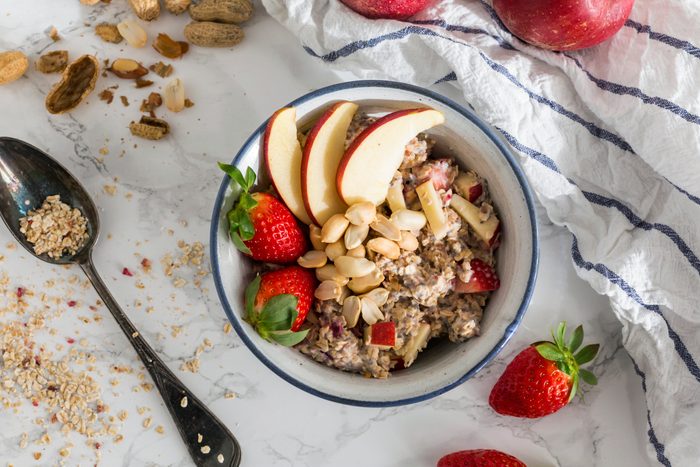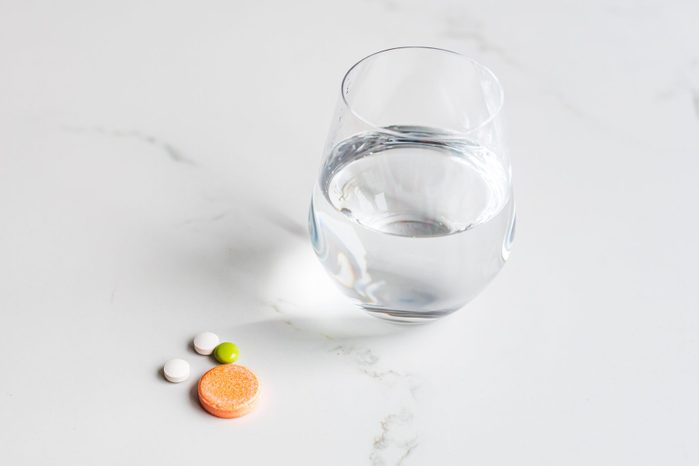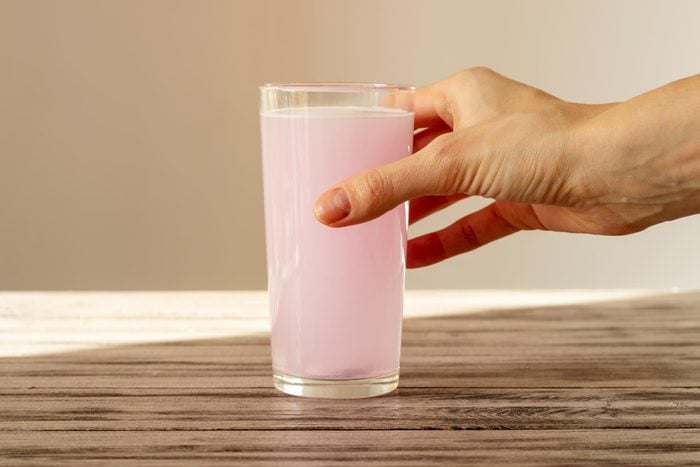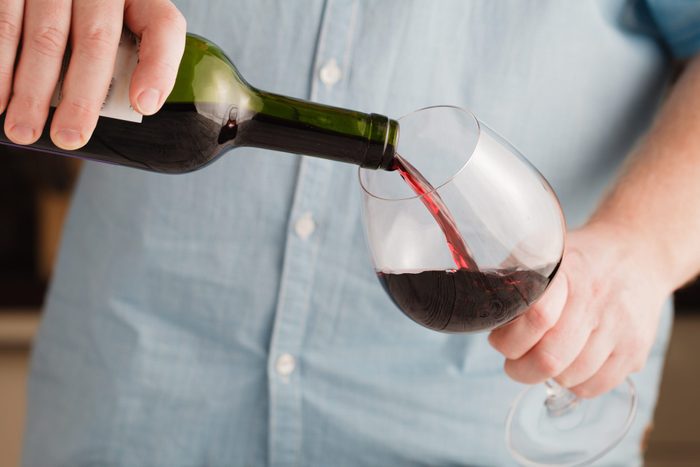
When festive times of the year roll around—or anytime you lose yourself in the moment catching up with the people you’ve missed—wanting to soak in the joy of celebration can lead to a not-so-cheerful next day.
It’s no surprise that research shows alcohol consumption spikes at certain times of year: For example, in 2014, two doctors of addiction and mental health led a study to conclude that there is a dramatic increase in alcohol sales around Christmas and New Year’s. If you do get a little carried away with the fun, we asked the experts how to prevent a hangover.
Liver doctor Nancy Reau, MD, section chief of hepatology at Rush University Medical Center in Chicago, IL, says the biggest cause of most hangovers tends to be dehydration. Dr. Reau explains that hangover-inducing dehydration often comes from “a combination of not drinking enough water, and diuretic effects directly from alcohol itself.”
Dr. Reau adds that another main reason alcohol leads to hangovers is that “alcohol is also pro-inflammatory,” which means drinking it “triggers immune pathways in your body which can cause physical symptoms and causes vasodilatation (making your blood vessels bigger), adding to dizziness and headaches.” If you’re reading this, you might not be a stranger to those lovely sensations.
Additionally, this liver expert points out that in a social atmosphere, it’s less likely that you’re reading product labels to check out whether there are additives and sugar in your beverage. Plus, alcohol affects your sleep patterns—which not only adds grogginess to the morning-after misery, but also denies your cells the opportunity to repair through sleep’s restorative power.
When there’s a chance a few sips will be part of your celebrations, here are the best ways to prevent a hangover that Dr. Reau and a nutrition expert gave us.

Eat foods that help prevent a hangover
Dr. Reau suggests the most important factor in preventing a hangover is not to drink on an empty stomach. “More important than the type of food is just eating,” she says. “Don’t skip a meal.” It’s a simple but powerful strategy: Having food in your system can slow down your body’s absorption of alcohol.
Registered dietitian Kate Morton, MS, RD, says breakfast in particular helps to offset a hangover—both the morning before you’re about to imbibe, as well as the morning after. “Consuming a healthy breakfast helps to maintain blood sugar levels and supplies essential vitamins and minerals, reducing hangover symptoms,” Morton says.
Consider including foods with the following for pre- or post-party breakfast:
- protein and fat, as these are digested slower and stick around longer to buffer the alcohol.
- foods high in fiber like oatmeal and lentils also help absorb and break down alcohol.
- fruits for their vitamins and antioxidants, which might help combat the pro-inflammatory effects of drinking.
- Morton suggests another to consider is the herb Kudzu (Pueraria lobata), which is traditionally used in Chinese medicine and helps to ameliorate hangover symptoms and treat chronic alcoholic liver injury. Morton says you can find teas and supplements made with this herb.

Take vitamins
Vitamin C doesn’t just fend off viruses—it can also prevent a hangover. “Vitamin C helps in supporting the liver after alcohol consumption,” Morton explains.
Also beneficial is vitamin B. “A vitamin B complex (B1, B2, B3, B6) is essential for reducing the toxic effects of alcohol on the body and brain, and may mitigate alcohol withdrawal symptoms,” she adds.
This Is the Alcoholic Drink That’s Least Harmful to Your Liver, Says a Liver Doctor

Sip on drinks that can help prevent a hangover
Besides drinking water, Morton suggests downing some electrolyte-enhanced beverages. “Replenishing electrolytes lost to alcohol’s diuretic effect is crucial for recovery,” Morton says.
Green juices and smoothies can also help prevent a hangover. Morton recommends drinks with cucumber, celery and green leafy vegetables as particularly beneficial for liver detoxification and high in electrolytes. Fresh green juice is also rich in vitamins and minerals, which may help.

Best ways to minimize hangover effects
Both Dr. Reau and Morton agree that one of the best ways to prevent a hangover is to practice moderate drinking. Says Dr. Reau, “Although some people will feel poorly with just one alcoholic beverage, excessive drinking will increase the risk of a hangover.”
The type of alcohol also matters, she adds. While red wine is said to wreak less havoc on your liver than other bevs, it’s also “notorious for causing headaches,” Dr. Reau says. “One hypothesis is that red wine contains more histamine because the whole grape is used, including the grape skin.” She adds that tannins in red wine also “lead to release of chemicals associated with pain.”
Last, preservatives and congeners (compounds in alcohol from the process of distilling and fermenting) may increase the chance of a hangover. “Darker liquors tend to have higher amounts of these substances,” Dr. Reau says. “Stick to clear or light beverages, as they will have less congeners.”
Dr. Reau suggests drinking two glasses of water between every alcoholic beverage. “Not only will you stay hydrated, but you’ll spread the time out between drinks and probably drink a lot less over the evening,” she says. A clever related hack from this liver doctor: “Adding ice to your drink will also dilute the amount you’re consuming.”
If you know hangover danger is on the horizon, simply being intentional enough to incorporate even just a couple of these choices may provide assurance your symptoms will be minimal.
- This Is the Healthiest Alcohol to Drink, According to Liver Doctors
- Here’s How Often You Should Really Weigh Yourself, Say Expert Doctors
- Following This Diet Improves Cholesterol, Says Unique New Study That Followed Identical Twins
- “Here’s How I Knew I Had Cervical Cancer”: One Survivor’s Story of Discovering Unexpected Symptoms

